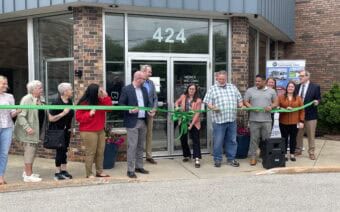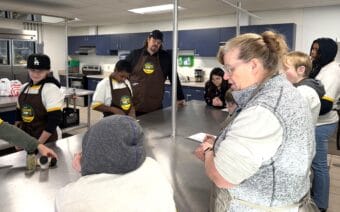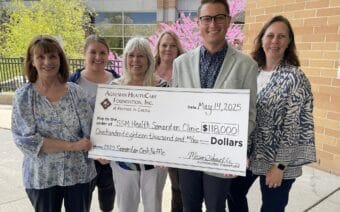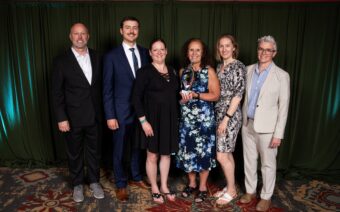
March 22, 2023
NORTHEAST WISCONSIN – Throughout Northeast and Central Wisconsin and Michigan’s Upper Peninsula, healthcare providers are doing what they can to make advance access to healthcare for infants, children, adolescents and teens.
Statistics provided by a joint venture between ThedaCare in Appleton, Bellin Health in Green Bay and Children’s Wisconsin in Milwaukee – the state’s only independent health system dedicated to the care of children – said there’s good reason for that.
Mark Cockley, chief clinical officer at ThedaCare in Appleton, said in the 25-county region of Northeast and Central Wisconsin, including the seven counties of the eastern part of Michigan’s Upper Peninsula, there are 180,000 individuals in the age range of zero to 18.
Compare that, Cockley said, to the 140,000 individuals aged zero to 18 who live in the Southeast Wisconsin service area of Children’s Wisconsin.
“It’s spread out,” he said. “So, you don’t realize the population is as big.”
Children’s Wisconsin opens new clinic
That’s why in early 2020, Children’s Wisconsin announced it would build a new clinic in Appleton, providing expanded services to the Northeast region and additional specialty providers dedicated to it.
That project, two years in the making, finally opened its doors earlier this month off Interstate 41’s Ballard exit at 2575 E. Evergreen Drive.
The new clinic replaces the 15,000-square-foot clinic originally established in 2002 at ThedaCare Regional Medical Center-Neenah – which is home to Children’s Wisconsin Fox Valley Hospital.

The new Children’s Wisconsin clinic in Appleton has a 3,000-square-foot gymnasium, which allows for expanded physical and occupational therapy services. Photo Courtesy of Children’s Wisconsin
“The Appleton Clinic will support the increasing number of families choosing to have their kids treated by Children’s Wisconsin experts and provide expanded services for current families in the region,” Matt Buelow, acting medical director of the Northeast region, said. “As someone who lives here and provides cardiology specialty services here, it is exciting to see the doors to the clinic open and see more kids getting care closer to where they live.”
Buelow said the Appleton clinic provides lab and imaging services specific to pediatric patients, as well as specialty services, including asthma/allergy, audiology, cardiology, diabetes/endocrinology, gastroenterology, urology and speech therapy.
The space also includes an expanded physical and occupational therapy services area – a 3,000-square-foot gymnasium.
“There’s a climbing wall, there’s a fort,” Buelow said. “There are all sorts of spaces for kids to work on any developmental areas they can, and that’s a unique thing about the region.”
Buelow said The Child Advocacy Center – which cares for kids who have experienced abuse or neglect – is also located in the building.
He said Children’s Wisconsin also supports the Green Bay and North Central Wisconsin child advocacy centers and is a founding partner and supporter of Catalpa Health, a collaboration designed to meet the Fox Valley’s growing need to support kids’ mental and behavioral health needs.

Matthew Buelow
Additionally, Buelow said Children’s Wisconsin partners with the Fox Valley Health Improvement Coalition and other health systems to complete a regular health needs assessment focused on children.
Up the highway in Green Bay, Children’s Wisconsin also sees patients in a space located inside the Prevea Clinic (1686 Eisenhower Road) in De Pere.
Gail Ostrander, vice president of Northeast regional services for Children’s Wisconsin, said when the specialty Children’s Wisconsin clinic was opened in Neenah in 2002, providers traveled back and forth from Milwaukee.
However, Ostrander said since 2016, Children’s Wisconsin has been adding full-time dedicated specialty providers to the clinic, resulting in 20,000 patient visits each year.
She said Children’s Wisconsin knows an additional 30,000 patient visits from the Northeast region occur at their Milwaukee location.
The goal, Ostrander said, is to keep care closer to home for those families and increase the number of patient visits to 50,000 on an annual basis at the Appleton clinic.
With future expansion, she said that number could rise to 70,000 patient visits.
Ostrander said Children’s Wisconsin plans to invest $30 million in the Northeast region in the next 10 years – with $12.3 million dollars coming from community philanthropic fundraising.
Focused on children
Appleton’s Children’s Wisconsin clinic is accompanied by a handful of other Northeast Wisconsin facilities geared toward the healthcare needs of children.
One of those is the HSHS St. Vincent Children’s Hospital – which is located within the walls of HSHS St. Vincent Hospital in Green Bay.
In partnership with Prevea Health, St. Vincent’s Children’s Hospital offers more than 70 pediatric specialists representing 30 different types of medical specialties – including pediatric intensivists, pediatric hematologists/oncologists, pediatric neurology (for things like muscular dystrophy, cerebral palsy and epilepsy disorders), pediatric cardiology and pediatric orthopedics (such as trauma/injuries, spine surgery and scoliosis).
Amber Chibuk, executive director of HSHS St. Vincent Children’s Hospital and Prevea Pediatrics, said the hospital is also home to a Level III NICU and the region’s only pediatric hematology/oncology clinic.
“When your child is sick or hurt, you will do anything to get them the best care possible,” she said. “That’s why we are always here. We are committed to bringing the experts here to Northeast Wisconsin so we can provide the best care locally and our families can avoid unnecessary travel.”?
Over the past three years, Chibuk said the children’s hospital has been extensively remodeled, which included the addition of a new pediatric emergency department and revamping of the pediatric intensive care unit and pediatric inpatient unit.
“The fact this multi-million-dollar renovation was made possible almost exclusively through community dollars demonstrates the community’s trust and belief in the expert medical care we provide to children and families right here in Green Bay, and across Northeast Wisconsin,” Chibuk said.
Amy Dettman, senior vice president of Bellin’s primary care and specialty service lines, said Bellin Health in Green Bay is also putting a focus on children.

Amy Dettman
Most recently, the provider announced it plans to break ground on a pediatric and adolescent specialty care clinic in the Village of Ashwaubenon (near the corner of Wisconsin Highway 172 and Ashland Avenue) in August this year.
Dettman said the 68,000-square-foot clinic is expected to be completed in December 2024 and will include a 14,000-square-foot space dedicated to Children’s Wisconsin providers.
The clinic will house Bellin pediatric primary care and psychiatric services, as well as the Bellin Health Adolescent Team.
Adolescent services are currently offered by Bellin at the East De Pere, Marinette and Iron Mountain, Michigan, clinics.
The clinic will also have an EOS machine, which Dettman said is important for children who require frequent imaging because of its low-dose radiation.
She said there will also be a sensory gym and a life skills lab for children on the autism spectrum.
Connected for Kids
ThedaCare, Bellin Health and Children’s Wisconsin health systems partnered together for a joint pediatric venture – “Connected for Kids,” which is a 15-year agreement that brings together the three individual health systems to positively impact the lives of children and adolescents who are under the care of Bellin and ThedaCare primary care doctors.
Buelow is the acting regional medical director for Connected for Kids.
“I think that’s the big point, is that Children’s, ThedaCare and Bellin all have great brands…,” he said. “It’s how can we come together and do even more?”
Connected for Kids will serve the 25-county region that includes Northeast and Central Wisconsin’s 18 counties and seven counties in the eastern part of the Upper Peninsula, Ostrander said.?
ThedaCare President and CEO Imran Andrabi said through the partnership, the healthcare systems will create a “destination for pediatric health and well-being” right here in Northeast Wisconsin.
Chris Woleske, president and CEO of Bellin Health said the partnership will provide a better patient experience.”
“That saves families valuable time, energy and cost, allowing them to focus on what matters most – supporting their loved ones,” she said.
Ostrander, who serves as acting vice president of Connected for Kids, said the partnership is designed to innovate services for children and streamline duplication of services.

Gail Ostrander
She said what the partnership means is that families in rural parts of Northeast and Central Wisconsin and the UP will have “access to world-class specialists” through Children’s Wisconsin.
“I don’t know if there’s another model like this,” she said.
Cockley said it goes back to the history the organizations have together, and realizing “individually we can’t do everything we need to do for our community.”
“(Patients of Bellin and ThedaCare) will start seeing, especially those who have kids coming into the office, more standardization,” he said.
Optimizing technology
The Connected for Kids partnership also allows for IT collaboration.
“It is a big endeavor,” Dettman said, “…having all of our IT systems to work together.”
Ostrander said Connecting for Kids is working with EPIC, based in Verona for its electronic health record (EHR) technology to improve the “interoperability” of record keeping between the three health systems for improved provider communication and easier parent/guardian access to a child’s records.
As chairperson of the Connected for Kids’ Quality and Safety Committee, Cockley said the health systems are currently setting up its best practice metrics, with the goal of being in the top 10% in quality nationwide.
Cockley said the Connected for Kids partnership is also looking to leverage its impact on wellness among kids in the Northeast region.
“That’s a big aspect of pediatric care, is keeping them healthy,” he said.
Cockley said initiatives might include working with school systems.
“I think this is a tremendous partnership,” he said. “It’s not replicated in a lot of other ways… It’s unique and exciting to be a part of.”
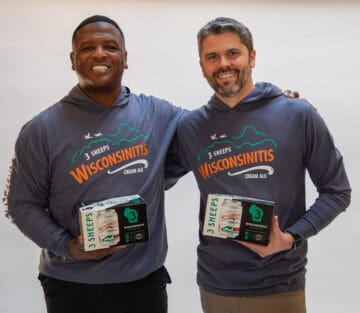 3 Sheeps, LeRoy Butler team up for NFL Draft celebrations
3 Sheeps, LeRoy Butler team up for NFL Draft celebrations Packers partner with Batteries Plus, promote battery recycling
Packers partner with Batteries Plus, promote battery recycling


